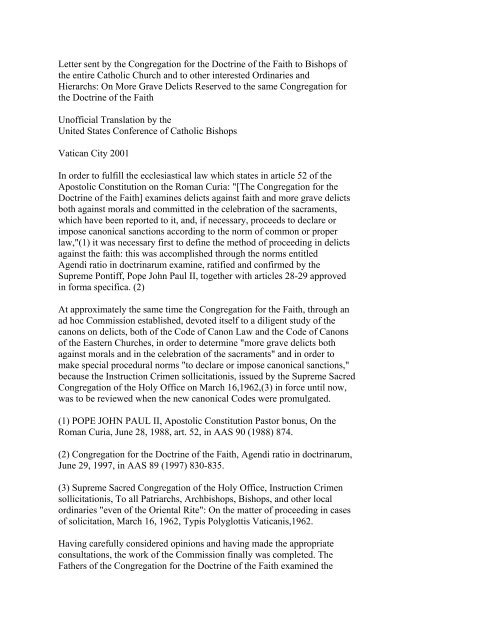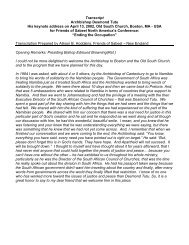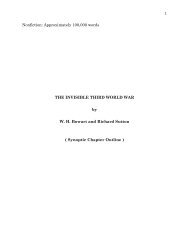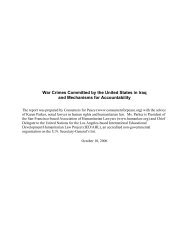Vatican cover letter for new policy - Weirdload Archives Index
Vatican cover letter for new policy - Weirdload Archives Index
Vatican cover letter for new policy - Weirdload Archives Index
You also want an ePaper? Increase the reach of your titles
YUMPU automatically turns print PDFs into web optimized ePapers that Google loves.
Letter sent by the Congregation <strong>for</strong> the Doctrine of the Faith to Bishops of<br />
the entire Catholic Church and to other interested Ordinaries and<br />
Hierarchs: On More Grave Delicts Reserved to the same Congregation <strong>for</strong><br />
the Doctrine of the Faith<br />
Unofficial Translation by the<br />
United States Conference of Catholic Bishops<br />
<strong>Vatican</strong> City 2001<br />
In order to fulfill the ecclesiastical law which states in article 52 of the<br />
Apostolic Constitution on the Roman Curia: "[The Congregation <strong>for</strong> the<br />
Doctrine of the Faith] examines delicts against faith and more grave delicts<br />
both against morals and committed in the celebration of the sacraments,<br />
which have been reported to it, and, if necessary, proceeds to declare or<br />
impose canonical sanctions according to the norm of common or proper<br />
law,"(1) it was necessary first to define the method of proceeding in delicts<br />
against the faith: this was accomplished through the norms entitled<br />
Agendi ratio in doctrinarum examine, ratified and confirmed by the<br />
Supreme Pontiff, Pope John Paul II, together with articles 28-29 approved<br />
in <strong>for</strong>ma specifica. (2)<br />
At approximately the same time the Congregation <strong>for</strong> the Faith, through an<br />
ad hoc Commission established, devoted itself to a diligent study of the<br />
canons on delicts, both of the Code of Canon Law and the Code of Canons<br />
of the Eastern Churches, in order to determine "more grave delicts both<br />
against morals and in the celebration of the sacraments" and in order to<br />
make special procedural norms "to declare or impose canonical sanctions,"<br />
because the Instruction Crimen sollicitationis, issued by the Supreme Sacred<br />
Congregation of the Holy Office on March 16,1962,(3) in <strong>for</strong>ce until now,<br />
was to be reviewed when the <strong>new</strong> canonical Codes were promulgated.<br />
(1) POPE JOHN PAUL II, Apostolic Constitution Pastor bonus, On the<br />
Roman Curia, June 28, 1988, art. 52, in AAS 90 (1988) 874.<br />
(2) Congregation <strong>for</strong> the Doctrine of the Faith, Agendi ratio in doctrinarum,<br />
June 29, 1997, in AAS 89 (1997) 830-835.<br />
(3) Supreme Sacred Congregation of the Holy Office, Instruction Crimen<br />
sollicitationis, To all Patriarchs, Archbishops, Bishops, and other local<br />
ordinaries "even of the Oriental Rite": On the matter of proceeding in cases<br />
of solicitation, March 16, 1962, Typis Polyglottis <strong>Vatican</strong>is,1962.<br />
Having carefully considered opinions and having made the appropriate<br />
consultations, the work of the Commission finally was completed. The<br />
Fathers of the Congregation <strong>for</strong> the Doctrine of the Faith examined the
Commission's work carefully and submitted to the Supreme Pontiff<br />
conclusions on the determination of more gave delicts and the manner of<br />
proceeding to declare or impose sanctions, with the exclusive competence in<br />
this of the Apostolic Tribunal of this Congregation remaining firm. All these<br />
things, approved by the Supreme Pontiff himself, were confirmed and<br />
promulgated by the Apostolic Letter given motu proprio beginning with the<br />
words Sacramentorum sanctitatis tutela.<br />
The more grave delicts both in the celebration of the sacraments and against<br />
morals, reserved to the Congregation <strong>for</strong> the Doctrine of the Faith, are: --<br />
Delicts against the sanctity of the most august Eucharistic Sacrifice and the<br />
sacraments, namely: 1E taking or retaining the consecrated species <strong>for</strong> a<br />
sacrilegious purpose, or throwing them away;(4) 2E attempting the liturgical<br />
action of the Eucharistic Sacrifice or simulating the same;(5)<br />
(4) Cf. Code of Canon Law, can.1367; Code of Canons of the Eastern Churches,<br />
can. 1442. Cf. Also Pontifical Council <strong>for</strong> the Interpretation of Legislative Texts:<br />
Response to proposed doubt, June 4, 1999.<br />
(5) Cf. Code of Canon Law, can., 1378 § 2 n. 1 and 1379; Code of Canons of the<br />
Eastern Churches, can.1443.<br />
-- A delict against morals, namely: the delict committed by a cleric against the<br />
sixth commandment of the Decalogue with a minor below the age of eighteen<br />
years.<br />
Only these delicts, which are indicated above with their definition, are reserved to<br />
the Apostolic Tribunal of the Congregation <strong>for</strong> the Doctrine of the Faith.<br />
As often as an ordinary or hierarch has at least probable knowledge of a reserved<br />
delict, after he has carried out the preliminary investigation, he is to indicate it to<br />
the Congregation <strong>for</strong> the Doctrine of the Faith which, unless it calls the case to<br />
itself because of special circumstances of things, after transmitting appropriate<br />
norms, orders the ordinary or hierarch to proceed ahead through his own tribunal.<br />
The right of appealing against a sentence of the first instance, whether on the part<br />
of the party or the party's legal representative, or on the part of the promoter of<br />
justice, solely remains valid only to the Supreme Tribunal of this Congregation.<br />
It must be noted that the criminal action on delicts reserved to the Congregation<br />
<strong>for</strong> the Doctrine of the Faith is extinguished by a prescription of ten years.(11)<br />
The prescription runs according to the universal and common law;(12) however,<br />
in the delict perpetrated with a minor by a cleric, the prescription begins to run<br />
from the day when the minor has completed the eighteenth year of age.<br />
In tribunals established by ordinaries or hierarchs, the functions of judge,<br />
promotor of justice, notary, and legal representative can validly be per<strong>for</strong>med <strong>for</strong>
these cases only by priests. When the trial in the tribunal is finished in any<br />
fashion, all the acts of the case are to be transmitted ex officio as soon as possible<br />
to the Congregation <strong>for</strong> the Doctrine of the Faith.<br />
(11) Cf. Code of Canon Law, can 1362 § 1 n 1: Code of Canons of the Eastern<br />
Churches, can. 1152 § 2, n. 1.<br />
(12) Cf. Code of Canon Law, cam 1362 § 2; Code of Canons of the Eastern<br />
Churches, can. 11525 § 3.<br />
All tribunals of the Latin Church and of the Eastern Catholic Churches are bound<br />
to observe the canons on delicts and penalties and also on the penal process of<br />
both Codes respectively, together with the special norms which are transmitted by<br />
the Congregation <strong>for</strong> the Doctrine of the Faith <strong>for</strong> an individual case and which<br />
are to be executed entirely.<br />
Cases of this kind are subject to the pontifical secret.<br />
Through this Letter, sent by mandate of the Supreme Pontiff to all the Bishops of<br />
the Catholic Church, to superiors general of clerical religious institutes of<br />
pontifical right and clerical societies of apostolic life of pontifical right, and to<br />
other interested ordinaries and hierarchs, it is hoped not only that more grave<br />
delicts will be entirely avoided, but especially that ordinaries and hierarchs have<br />
solicitous pastoral care to look after the holiness of the clergy and the faithful<br />
even through necessary sanctions.<br />
Rome, from the Offices of the Congregation <strong>for</strong> the Doctrine of the Faith, May<br />
18, 2001.<br />
+ Joseph Cardinal Ratzinger, Prefect<br />
+ Tharsicius Bertone, S.D.A., Archbishop Emeritus of Vercelli, Secretary






